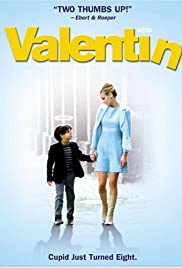
VALENTIN
Argentina, 2002, 82 minutes, Colour.
Rodrigo Noya, Carmen Morae, Julieta Cardinale.
Directed by Alejandro Agresti.
Alejandro Agresti is one of Argentina's foremost filmmakers. This brief film is a piece of autobiography. Agresti has reminisced about one year of his life (1969) and shown us Buenos Aires in those days, well before the Generals and the dictatorship. A young priest gives a sermon on the death of Che Guevara and challenges his congregation in a liberation theology way and the wealthy walk out.
The character who stands in for him is called Valentin, a cross-eyed eight year old boy, whose mother has abandoned him, whose father is too busy with work and finding a new partner to attend to him, who lives with his widowed grandmother who has reached the age of aches and complaining.
Valentin wants to be an astronaut but Neil Armstrong beats him to the moon.
Valentin is very observant and gives us quite a literate and perceptive voiceover commentary on what is going on in his life, in his care for his grandmother, especially cajoling a doctor into paying a house call, in his puzzle about his absent mother (because his grandmother and father toss off the line that she was Jewish). Two people whom he does befriend are one of his father's girlfriends, a beautiful and friendly young woman called Leticia, and his neighbour Rufo, who teaches him the piano and with whom he can talk about all the issues of the world.
Agresti lived the details of Valentin's life. He also plays the father in a scene of brutal anger that Agresti said was most difficult to play because of memories that it brought back. Most audiences will like Valentin's story and not simply because he seems a 'cute' child but because of its emotion and truth.
1. The work of Agresti, his place in Argentinian filmmaking? His re-creating of the late 1960s, the memories for Argentina, his own autobiography, of himself, a year in his life, his father and grandparents?
2. Buenos Aires, the city, homes, cafes, streets? Authentic atmosphere? Score?
3. The portrait of Valentin, his ability as a storyteller, the ending and his becoming a writer, his detailed voice-over, his interpretation of the events, the portrait of an eight-year-old with an adult mentality, his grandparents, his comments on his grandmother, the grief at the grandfather's death, her complaints, his absent parents, his father's arrival and his anger, doing his work, his girlfriends, accusing Valentin of turning his girlfriend against him? The prejudice against his Jewish mother? His wanting to be an astronaut, building things and reading about astronauts? His schoolwork, life at home, his care for his grandmother, his observations of people, his uncle's visit and enjoying it, his friendship with Rufo, learning the piano, their discussions in the restaurant? The meeting with Leticia, her charm, beauty, going out with her, her gift, the discussions, the meal, going to the movies, his talk about his father? His father's anger at his turning Leticia away? His going to the doctor, his plan for his grandmother, pressurising the doctor, his visit, changing the household? His buying the gift of the painting and giving it to the doctor? His grandmother and her illness, going to hospital, dying - and the phone call while he was sleeping and Rufo answering? The death of his grandmother, the selling of the house, his never being able to go back inside the house? Meeting the man with the shirt, the comments about his mother and her love for him? Going to stay with friends? The visit of Leticia, the phone call, setting her up with Rufo - with the consequences he intended?
4. The grandmother, her age, experience, grief, her attitude towards her son, Jewish daughter-in-law, her care of Valentin, her illness, her death? Her stories?
5. The sketch of Valentin's father, his absence, his driving his mother away, his brutality in interrogating his son? The contrast with his kindly uncle?
6. Rufo, his friend, his girlfriend, the playing of the piano? Their discussions in the restaurant, meeting Leticia, dressing up?
7. Leticia, a good woman, charming, her listening to Valentin, the gift, her taking his advice about his father? Her return, the meeting with Rufo, the happy ending?
8. The visit to the church, the death of Che Guevara, the priest and his sermon on liberation theology (a real-life occurrence for Agresti as a boy)?
9. His friends, the friendliness of Valentin, chatting with people, his hopes, observations? The irony that his observations were made by a cross-eyed boy? His worldly-wise attitudes? A child's perspective on the world?